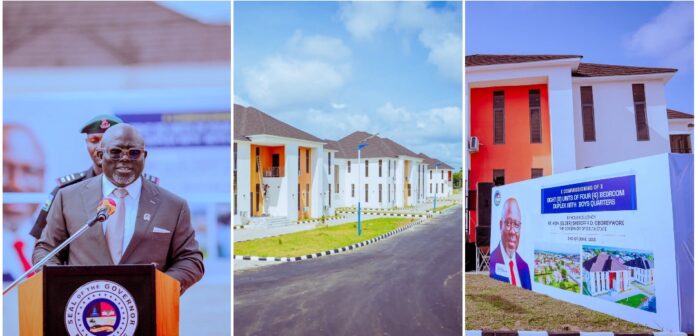By Godwin Udoh
In many developing countries, including Nigeria, inadequate housing continues to be a major problem. This issue leads to serious social, economic, and health-related challenges for citizens.
Governments are expected to ensure that citizens have access to safe, affordable, and decent housing. Unfortunately, from what I’ve observed, our government has fallen short in meeting this responsibility—resulting in consequences that affect individuals and society as a whole.
This article looks into how the government’s failure to provide suitable housing has led to social unrest, economic hardship, and health problems for many citizens.
Social Instability and Inequality
One major result of poor housing provision is increased social instability and inequality. When the government doesn’t offer adequate housing, many low-income families are left to live in poor and overcrowded conditions.
This creates tension among residents, increases the chances of conflict, and exposes people to higher risks of infectious diseases, especially during pandemics.
Areas with poor housing conditions often experience higher crime rates, as poverty can push some individuals into criminal activities. Poor housing also leads to social segregation—where marginalized groups are confined to underdeveloped neighborhoods with fewer opportunities.
In such environments, climbing out of poverty becomes difficult. Housing insecurity affects education, healthcare, and job access—all of which are essential for a better life.
Economic Impact
The economic consequences of inadequate housing are serious and far-reaching.
First, poor housing affects people’s productivity. Those living in uncomfortable or unhealthy environments face stress and health issues that can interfere with work and personal growth.
When people constantly worry about rent or shelter, they find it hard to focus on their jobs or self-improvement.
Also, when neighborhoods are filled with poorly built houses, property values drop. This reduces tax income for local governments, which in turn affects public services like schools, healthcare, and transportation.
Another major concern is how this issue affects the construction industry. When there’s a shortage of decent housing, prices go up, and slums begin to grow. These informal settlements often become hotspots for crime and poverty, stalling overall economic growth.
Health Issues
Inadequate housing is closely linked to poor health. Many poorly built homes lack clean water, proper sanitation, and are made with unsafe materials like lead or mold—all of which can cause long-term health problems.
Overcrowded homes make it easy for diseases to spread. In such conditions, it’s difficult to keep the environment clean, putting families at risk.
Mental health is also affected. Living in a stressful or unsafe environment can lead to anxiety, depression, and emotional breakdowns.
On top of that, people in these areas often have little to no access to proper healthcare. When clinics are far or poorly equipped, illnesses go untreated, leading to worse conditions and making it harder for individuals to stay healthy enough to work or find better housing.
Impact on Education
Children living in poor housing conditions also suffer educational setbacks.
Overcrowding at home makes it hard for them to concentrate, read, or complete homework. Unstable housing often leads to frequent relocations, disrupting school attendance and academic performance.
Even the schools in these neighborhoods suffer. Due to limited funding, they face challenges like overcrowded classrooms, lack of learning materials, and fewer extracurricular activities—all of which affect the quality of education.
Long-Term Effects
The long-term effects of inadequate housing are damaging. Children who grow up in unstable or unhealthy homes may carry those negative experiences into adulthood, continuing the cycle of poverty and struggle.
When people feel neglected by their government, they can lose trust in political systems. This can lead to lower voter turnout and reduced community involvement, weakening national unity and development.
Delta State’s Example
In 2024, the Delta State Government began the construction of 50 residential units: 30 three-bedroom and 20 two-bedroom apartments across Ozoro, Kwale, and Owa-Ogubu local government areas.
While this sounds promising, the reality is different. Often, these homes—meant for civil servants and low-income families—are given or sold to political allies. These individuals then rent the homes out to civil servants at high costs, defeating the original purpose of affordable housing for the masses.
Conclusion
The government’s failure to provide adequate housing has serious consequences—socially, economically, and health-wise. This is not just a problem for individuals, but for communities and the nation as a whole.
To break this cycle, the government must prioritize affordable, accessible, and decent housing as a key part of public policy. Housing is not just a roof over one’s head—it is the foundation for a better life, healthier communities, and a more stable society.
Providing quality housing for all is not just a moral duty—it’s a smart investment in the country’s future.



